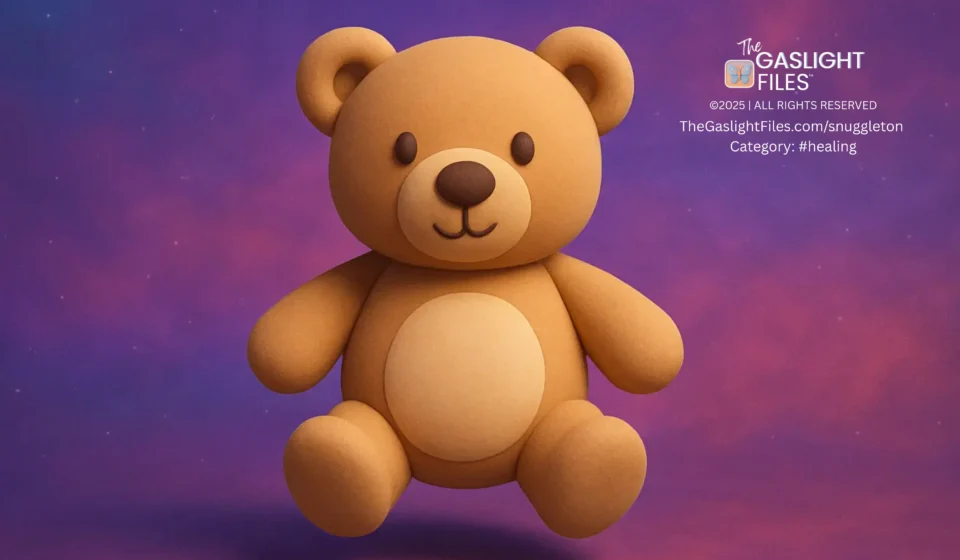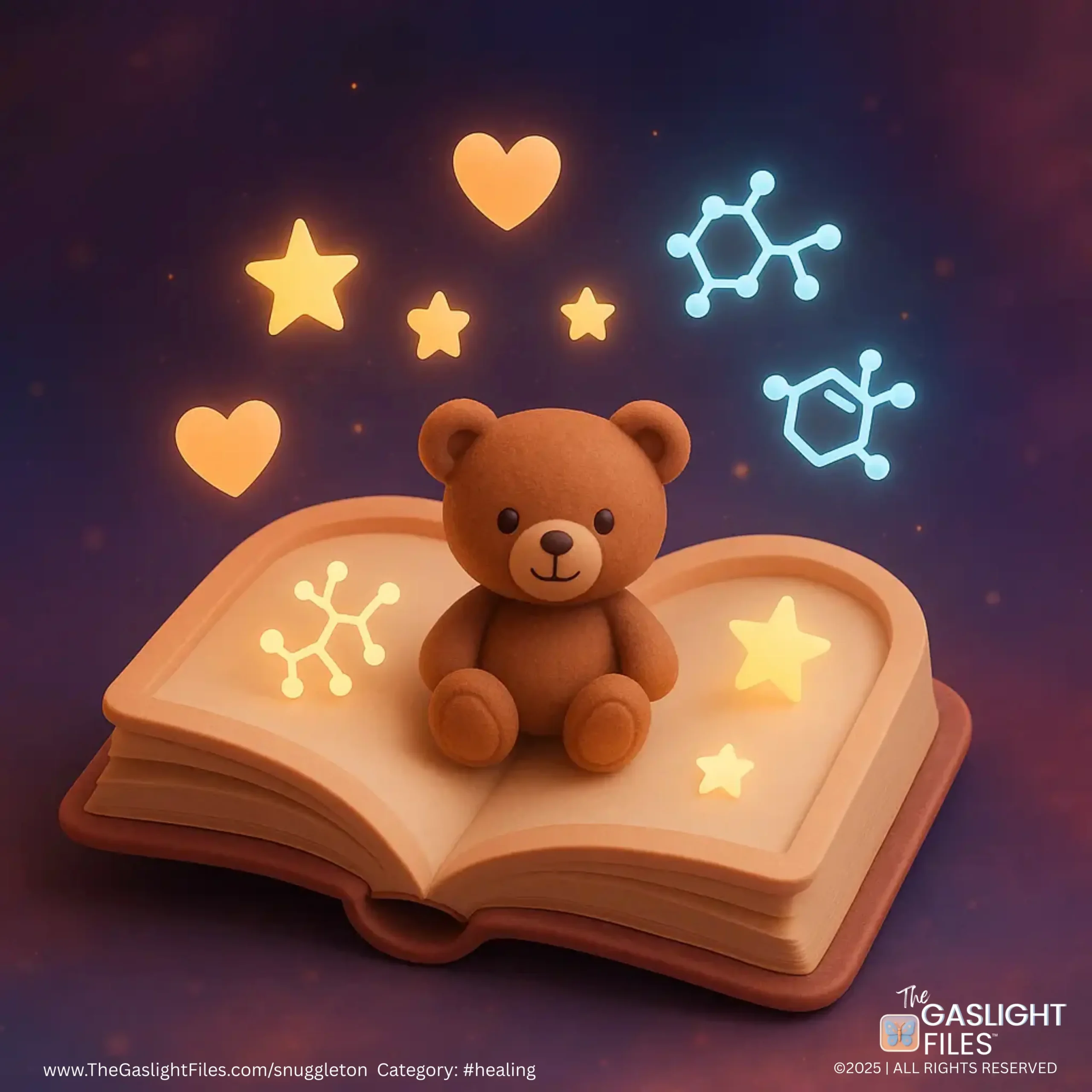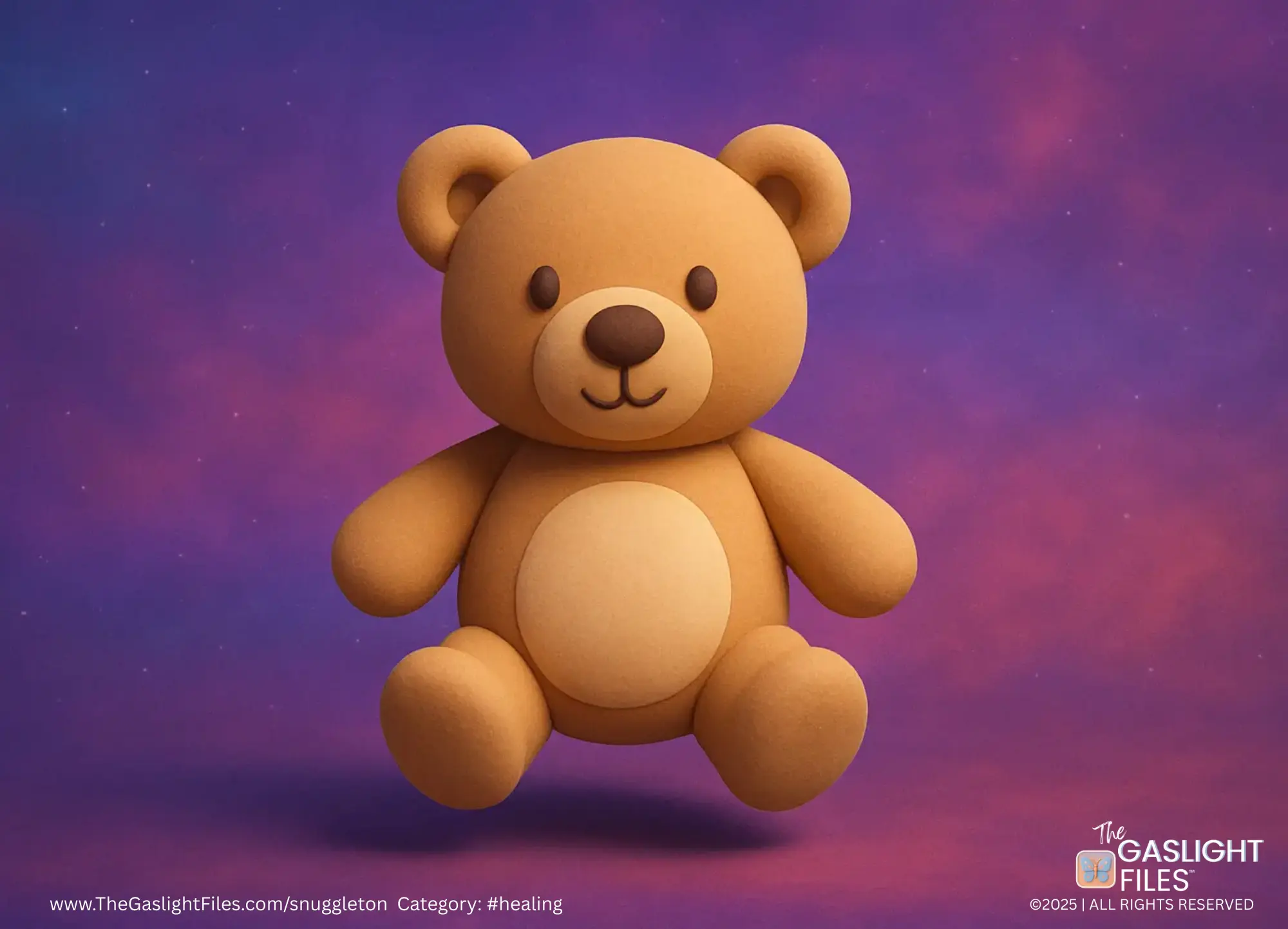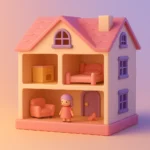
Snuggleton: A Soft Friend
in a Hard World
What one quiet bear can teach us about safety, softness, and surviving emotion.
He never told you to smile.
He never flinched when you cried.
He never rolled his button eyes or made you feel silly for feeling too much.
Table Of Contents
Snuggleton just… was.
Always there.
Quiet.
Steady.
Soft.
He was the one comfort in the room that didn’t demand anything from you.
Didn’t shame you for needing.
He didn’t mock your tears.
He didn’t punish your softness.
He didn’t walk away when you needed holding.
Didn’t try to fix you — or make you smaller.
He was everything the world sometimes failed to be.
And you loved him for it.
Not because he gave advice.
But because he stayed.
Going Deeper: The Soft
Science of Bonding, Belonging, and Bears
Love, safety, and touch — they’re more than emotional. They’re chemical.
You might be surprised how scientifically normal your feelings are.
Studies show that:
-
Touching or petting a dog reduces cortisol and increases oxytocin — a hormone critical to emotional bonding.
-
Even looking at pictures of cute puppies or kittens can trigger oxytocin release and improve focus.
(Hiroshima University Study, 2012) -
Oxytocin and vasopressin are the key bonding chemicals observed in prairie voles, one of the few monogamous species — and these same systems operate in human attachment.
(Dr. Larry J. Young, Emory University)

“Oxytocin and vasopressin help create the feeling that another individual is special and emotionally significant.”
— Dr. Larry J. Young
And what about grief?
-
After the death of a lifelong partner, humans sometimes suffer Broken Heart Syndrome (Takotsubo cardiomyopathy) — an actual physical weakening of the heart from loss.
Mortality risk rises dramatically in the weeks that follow.
(Journals of Gerontology, 2013)
All of this proves what your body has known all along:
We are wired for closeness.
For comfort.
For cuddles and calm.
And if you were ever shamed for needing that?
Especially by someone emotionally unavailable — like a narcissistic caregiver —
You weren’t the problem.
Fact: Narcissists often lack emotional empathy and have trouble processing others’ emotions.
In more extreme profiles (antisocial, psychopathic), that empathy may be virtually nonexistent.
So…
-
A highly empathetic child raised by someone emotionally impaired?
-
A heart told to “stop being so dramatic”?
-
A soul shamed for loving deeply?
It’s no wonder you sought refuge in something soft.
Snuggleton didn’t just comfort you.
He saw you.
And here’s what’s even more profound:
“Emotions are chemical signatures in the body, and when we repeatedly feel the same emotion (especially negative ones), our bodies become chemically addicted to those familiar states — through neuropeptide signaling.”
— Dr. Joe Dispenza
This means the emotional shaming you endured wasn’t just painful —
It became your body’s baseline.
A loop.
A chemical addiction to anxiety, fear, rejection, or self-doubt.
But something soft — like a teddy bear, like a safe moment, like love —
can begin to interrupt the pattern.
Even the smallest safe bond starts to whisper to your nervous system:
“It doesn’t have to be like this forever.”

The Wisdom of Soft Things
“Nothing is softer or more flexible than water, yet nothing can resist it.”
— Lao Tzu, Tao Te Ching
The softness you clung to as a child wasn’t weakness.
It was wisdom.
It was instinct.
It was survival.
Because real love — the kind that heals — isn’t forceful or loud.
It’s quiet. Present. Enduring.
Reflections to sit with:
-
What if softness isn’t surrender, but strength — the kind that outlasts the storm?
-
What if gentleness was always your greatest resilience?
-
What if your longing to be held is a spiritual remembering — not a flaw?
And what if Snuggleton — soft, steady, and still — was your first glimpse of that truth?
Your Story Isn’t Over
So if you’ve ever felt “too much”…
Or found yourself crying over a clay bear in space…
Please know this:
You are perfectly normal.
Actually — you’re beautifully human.
The ones who taught you to be hard?
They were only repeating what they were taught.
But you don’t have to keep repeating it.
Let softness live here.
Let Snuggleton stay.
✨Want to go deeper with this story?
Download the Snuggleton Reflection Guide — a free, printable PDF that gently guides you through extended reflections, journaling prompts, and soft-space checklists inspired by the emotional themes in this post
— offering space to explore your healing at your own pace.
Click here to get your free Reflection Guide.
✨ If this resonated, share it with someone who needs to know they’re not alone.
💬 Tell us your story or reflections in the comments below — your voice matters here.
🎧 Don’t forget to subscribe to The Gaslight Files for more healing stories, quiet awakenings, and truths that help you rise.
📚 Explore our recommended reading list — curated books on healing, boundaries, and emotional clarity.
📝 Start your journey with our daily journaling notebooks — in print or instant PDF download.
🎓 Go deeper with our online healing courses — self-paced and created just for you.
━━━━━━━━━━━━━━━━━━━━━━━━━━
Wishing you peace, growth, and all the best,
~ The Gaslight Files Team







